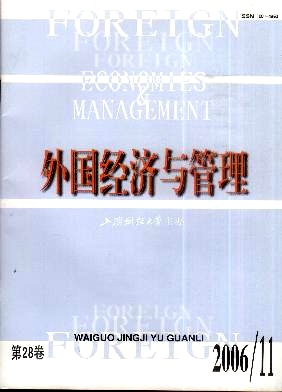国外组织情境下魅力型领导理论研究探析
外国经济与管理 2006 年 第 28 卷第 11 期, 页码:20 - 27
摘要
参考文献
摘要
本文对国外组织情境下魅力型领导理论的主要研究成果进行了综述,在阐明了魅力型领导内涵的基础上,从魅力型领导的形成、效能以及影响因素等视角对相关的理论和实证研究成果进行了梳理,并对魅力型领导理论的未来研究方向进行了展望。
[1]House,Robert J.A 1976 theory of charismatic leadership[A].Hunt,James G,and Larson,Lars L(Eds.).Leadershipthe cutting edge[C].London:Feffer&Simons,1977:189-207.
[2]Conger,Jay A.Charismatic and transformational leadership in organizations:an insider’s perspective on these developingstreams of research[J].Leadership Quarterly,1999,10(2):145-170.
[3]Bass,Bernard M.Leadership and performance beyond expectations[M].New York:Macmillan,1985:35-62.
[4]Conger,Jay A,and Kanungo,Rabindra N.Charismatic leadership:the elusive factor in organizational effectiveness[M].London:Jossey-Bass,1988:78-97.
[5]Shamir,Boas,House,Robert J,and Arthur,Michael B.The motivational effects of charismatic leadership:a self-con-cept based theory[J].Organization Science,1993,4(4):577-594.
[6]House,Robert J,and Howell,Jane N.Personality and charismatic leadership[J].Leadership Quarterly,1992,3(1):81-108.
[7]Groves,Kevin S.Linking leader skills,follower attitudes,and contextual variables via an integrated model of charismaticleadership[J].Journal of Management,2005,31(2):255-277.
[8]de Hoogh,Annebel H B,et al.Leader motives,charismatic leadership,and subordinates’work attitude in the profit andvoluntary sector[J].Journal of Management,2005,16:17-38.
[9]Howell,Jane M,and Shamir,Boas.The role of followers in the charismatic leadership process:relationships and theirconsequences[J].Academy of Management Review,2005,30(1):96-112.
[10]Kirkpatrick,Shelley A,and Locke,Edwin A.Direct and indirect effects of three core charismatic leadership compo-nents on performance and attitudes[J].Journal of Applied Psychology,1996,81(1):36-51.
[11]de Groot,Timothy,Kiker,D Scott,and Cross,Thomas C.A meta-analysis to review organizational outcomes relatedto charismatic leadership[J].Canadian Journal of Administrative Sciences,2000,17(4):356-372.
[12]Lowe,Kevin B,and Galen,Kroek K.Effectiveness correlates of transformational and transactional leadership:a meta-analytic review of the MLQ literature[J].Leadership Quarterly,1996,7(3):385-426.
[13]Conger,Jay A,and Kanungo,Rabindra N.Charismatic leadership and follower effects[J].Journal of OrganizationalBehavior,2000,21:747-767.
[14]Flynn,Francis J,and Staw,Barry M.Lend me your wallets:the effect of charismatic leadership on external support foran organization[J].Strategic Managment Journal,2004,25:309-330.
[15]Waldman,David A,Ramirez,Gabriel G,and House,Robert J.Does leadership matter?CEO leadership attributes andprofitability under conditions of perceived environmental uncertainty[J].Academy of Management Journal,2001,44(1):134-143.
[16]Agle,Bradley R,et al.Does CEO charisma matter?an empirical analysis of the relationships among organizational per-formance,environmental uncertainty and top management team perceptions of CEO charisma[J].Academy of Manage-ment Journal,2006,49(1):161-174.
[17]Shamir,Boas,and Howell,Jane M.Organizational and contextual influences on the emergence and effectiveness ofcharismatic leadership[J].Leadership Quarterly,1999,10(2):257-284.
[18]Pillai,Rajnandini,and Meindl,James R.Context and charisma:a“meso”level examination of the relationship of or-ganic structure,collectivism,and crisis to charismatic leadership[J].Journal of Management,1998,24(5):643-671.
[2]Conger,Jay A.Charismatic and transformational leadership in organizations:an insider’s perspective on these developingstreams of research[J].Leadership Quarterly,1999,10(2):145-170.
[3]Bass,Bernard M.Leadership and performance beyond expectations[M].New York:Macmillan,1985:35-62.
[4]Conger,Jay A,and Kanungo,Rabindra N.Charismatic leadership:the elusive factor in organizational effectiveness[M].London:Jossey-Bass,1988:78-97.
[5]Shamir,Boas,House,Robert J,and Arthur,Michael B.The motivational effects of charismatic leadership:a self-con-cept based theory[J].Organization Science,1993,4(4):577-594.
[6]House,Robert J,and Howell,Jane N.Personality and charismatic leadership[J].Leadership Quarterly,1992,3(1):81-108.
[7]Groves,Kevin S.Linking leader skills,follower attitudes,and contextual variables via an integrated model of charismaticleadership[J].Journal of Management,2005,31(2):255-277.
[8]de Hoogh,Annebel H B,et al.Leader motives,charismatic leadership,and subordinates’work attitude in the profit andvoluntary sector[J].Journal of Management,2005,16:17-38.
[9]Howell,Jane M,and Shamir,Boas.The role of followers in the charismatic leadership process:relationships and theirconsequences[J].Academy of Management Review,2005,30(1):96-112.
[10]Kirkpatrick,Shelley A,and Locke,Edwin A.Direct and indirect effects of three core charismatic leadership compo-nents on performance and attitudes[J].Journal of Applied Psychology,1996,81(1):36-51.
[11]de Groot,Timothy,Kiker,D Scott,and Cross,Thomas C.A meta-analysis to review organizational outcomes relatedto charismatic leadership[J].Canadian Journal of Administrative Sciences,2000,17(4):356-372.
[12]Lowe,Kevin B,and Galen,Kroek K.Effectiveness correlates of transformational and transactional leadership:a meta-analytic review of the MLQ literature[J].Leadership Quarterly,1996,7(3):385-426.
[13]Conger,Jay A,and Kanungo,Rabindra N.Charismatic leadership and follower effects[J].Journal of OrganizationalBehavior,2000,21:747-767.
[14]Flynn,Francis J,and Staw,Barry M.Lend me your wallets:the effect of charismatic leadership on external support foran organization[J].Strategic Managment Journal,2004,25:309-330.
[15]Waldman,David A,Ramirez,Gabriel G,and House,Robert J.Does leadership matter?CEO leadership attributes andprofitability under conditions of perceived environmental uncertainty[J].Academy of Management Journal,2001,44(1):134-143.
[16]Agle,Bradley R,et al.Does CEO charisma matter?an empirical analysis of the relationships among organizational per-formance,environmental uncertainty and top management team perceptions of CEO charisma[J].Academy of Manage-ment Journal,2006,49(1):161-174.
[17]Shamir,Boas,and Howell,Jane M.Organizational and contextual influences on the emergence and effectiveness ofcharismatic leadership[J].Leadership Quarterly,1999,10(2):257-284.
[18]Pillai,Rajnandini,and Meindl,James R.Context and charisma:a“meso”level examination of the relationship of or-ganic structure,collectivism,and crisis to charismatic leadership[J].Journal of Management,1998,24(5):643-671.
引用本文
董临萍, 张文贤. 国外组织情境下魅力型领导理论研究探析[J]. 外国经济与管理, 2006, 28(11): 20–27.
导出参考文献,格式为:
上一篇:德鲁克经营思想述评
下一篇:中小企业政策演变特征与前沿研究





 6445
6445  0
0

